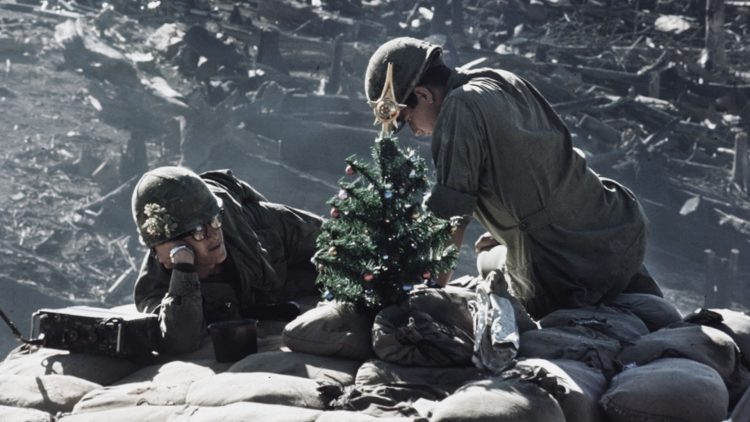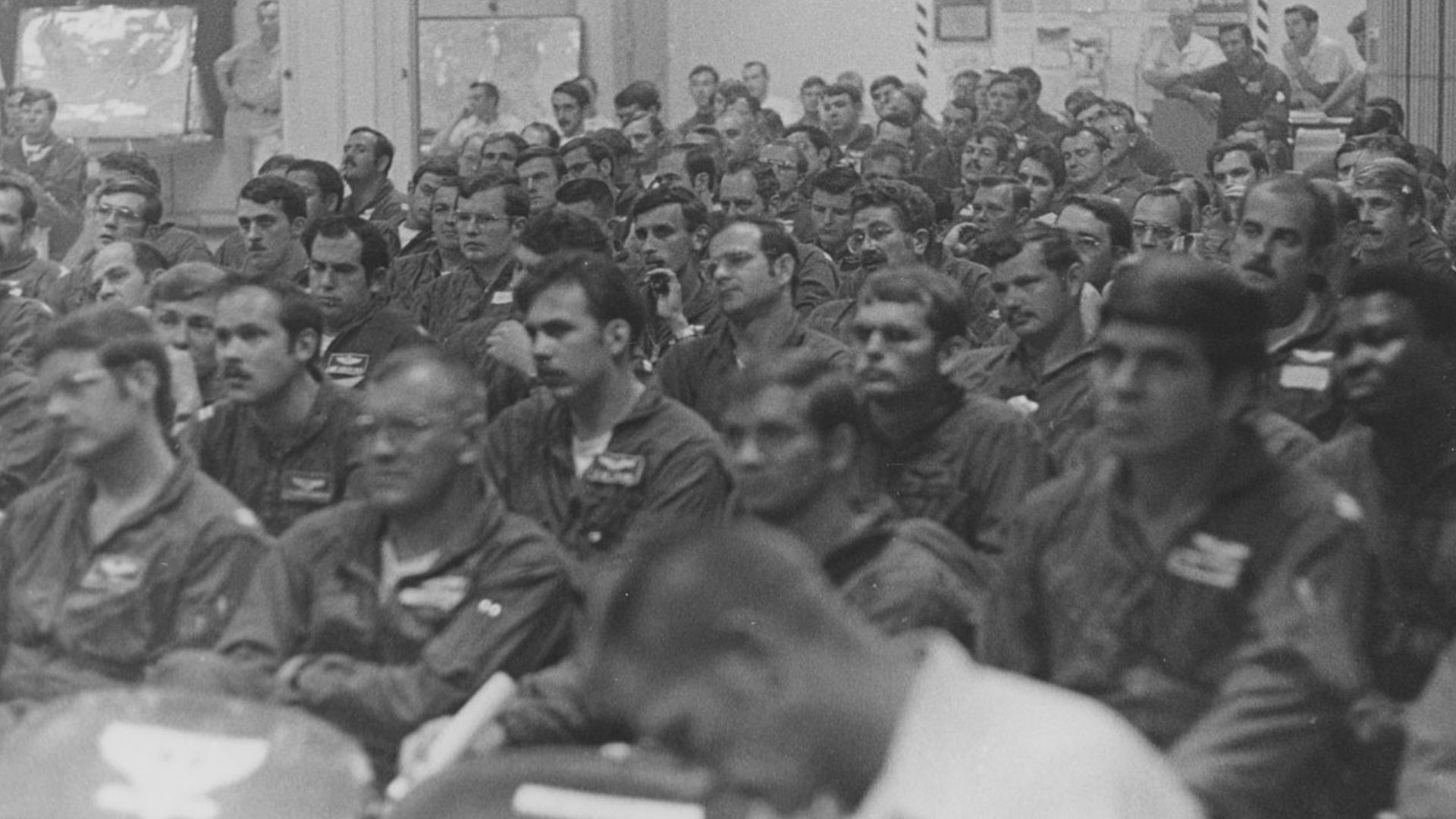By noon, the unit had reached the edge of the jungle and remained hidden in the shrouding dark and thick vegetation that marked the termination of the Deep Green and the open, brilliant light and vista of the open fields. Where intense light and heavy moisture meet, vegetation creates a significant discriminatory boundary. The soldiers stopped just short of the jungle limit, dropped in the welcome shade, and formed into a triangular formation. The commander quietly indicated with hand gestures—Eat and Rest. Subordinate leaders selectively chose several of their elements and moved them to security positions just outside the view of the resting perimeter.
Troops reached into their rucksacks or pants pockets and extracted a can or package of food, and began a desultory ingestion. Some lay their heads on their rucksack and smoked deeply on a cigarette. Others just pulled a long draught from a canteen, wiped their faces with an already saturated cloth, and quietly awaited the next act in their life.
The commander, centered now in the perimeter, called in his subordinate leadership. They quietly gathered in a circle and listened. The unit would be picked up at 1400 from a pickup zone they would establish just 100 yards from here in the adjacent paddy field. They would be flown back to base camp and move directly to a division assembly area next to the airfield. They were to be part of the audience for the annual Bob Hope Christmas show, which would arrive shortly. There would be no showers, beer, chow, or fresh clothes. Hop off the choppers and assemble in front of Hope. Merry Christmas.
The commander explained that this was the only field unit to be brought in as it had been the longest without rotation. They would also be provided a relatively close seating to the stage as they would be the only troops present with full field gear, weapons, and rucksacks. This was intended to be an honor and a present from the seniors for good work. There were several questions and queries, none of which could be adequately addressed. The group soon broke up and moved to their respective elements to pass on the upcoming events.
By 1400, the troops were standing in the blazing clean sunlight of an Eastern dry season day. They were arranged in a series of six groups, each with three soldiers facing three soldiers spread along a distance in the dry rice fields of approximately 100 yards. A yellow smoke canister popped in the middle of the formation—the smoke spiraling slowly upward in the still furnace-hot day.
Precisely on time, a string of helicopters arrived overhead, settled by each group, and, with beating blades, swirled and mixed the smoke, dirt, and rice husks into an obscuring brown cloud saturating the entire area. As soon as the skids touched the earth, the troops moved toward the aircraft, placed their boots on the skids, and in a single seemingly choreographed uniform move, turned their back to the interior, dropped their rucks on the floor, and sat down on the edge of the interior floor, looking out, legs dangling below.
In less than fifteen seconds, the birds pulled full power, creating another all-encompassing mottled brown cloud of detritus, and struggled for the blue sky. Inside, the troops closed their eyes to the debris and then opened them as the hot waves of dirt and JP 4 fumes dissipated—to be replaced by the cool forced air of the forward flight. For the first time in weeks, the sweat, dirt, and heat ventilated from the uniforms and were replaced by a sense of wonderful coolness. Eyes focused on the glimmering shimmering fields, creeks, villages, and vegetation below. Minds wandered into a resting neutral state for the flight until an abrupt change of RPM and downward plunge announced arrival.
The birds touched down momentarily on a partially asphalted strip, bringing up great gouts of laterite dirt and the gluey stench of JP 4. Several people in starched fatigues and spit-shined boots motioned them to an assembly area where they were to stand and await the remainder of the unit. There was no shade and no discussion, though ice water was available from several Lyster bags spotted throughout the open field.
In less than an hour, the entire unit had assembled, drunk its fill, and awaited instructions. The commander, with no discussion, formed the unit. Walking at the head, he led the snaking column for less than a mile when they passed through a large bowl-shaped enclosure marked by white engineer tape. Several more starched fatigues approached the commander and hastily pointed to an area near a large stage and white tent. The commander resumed his walk to the designated area.
The unit, less than a hundred, found itself within 30 meters of the center stage, surrounded by the mass of the local units and headquarters. Directly in front of them were the wounded and sick from the local medical facilities. They were dressed in light green hospital gowns, with the wheelchair patients at the very front. Surrounding them was a covey of nurses and doctors, predominately in white, with arrays of IVs, bottles, and other medical paraphernalia. Directly in front of the wheelchairs were two rows of very senior personnel—all in tightly starched fatigues, spit-shined boots, and wearing custom-tailored hats with embroidered rank and other badges.
The troops dropped their rucks, shouldered the rifles with barrels pointing down, and sat on the back of the rucks as tightly as the NCOs could force them. Several starched fatigues walked through the group, placing the machine gun barrels and pointing to the rear rather than toward the stage.
In time, the area was filled with a mass of humanity all there to enjoy the annual Christmas visit of Bob Hope and his troupe. Loudspeakers on poles were scattered throughout the assemblage, but the quality was more of noise and volume than clarity. The banter between Hope and his companions was largely lost toward the rear, and the loud music quickly dissipated. The female dancers elicited loud cries from the massed troops as flesh, memories, and hopes pervaded the large mass of vigorous hormonal youth that compose our best soldiers.
Between acts, the troops reflected the reality of all audiences with low-level talking, smoking, and the basic noises of a crowded humanity. The sun was stultifyingly hot and brought an individual torpor that only the most engaged could ignore.
The Hope show was well managed with alternating talk, music, dancing, and diversion. Professional as Hope and 50 years of experience displayed, in time, the noise and overarching static equaled or dominated the production. The individuals retreated into private worlds for moments only to be brought out by a specific word, note, or happening from the stage. But Hope had achieved his larger aim as the troops didn’t care if they missed a nuance of a joke or song—for a brief period, they were not in mortal danger, and a piece of The World was present. This was Christmas, but it was not Home.
After about an hour and without announcement but backed by the dull noise of the assembled soldiers and their life buzz, a solitary female walked to the center of the unoccupied stage. She was wearing a long, full, ochre-colored dress that was so different from the red meat animal flesh exposed by previous females on the stage. Her hair was a dark auburn that fell to her shoulders and curled at the ends, barely missing the top of the dress. She looked like the girls at Home. Unheard by most, she began to sing.
The notes were initially lost on the somewhat distracted crowd except for the very first rows of wounded and senior officers who watched transfixed in mute silence. Then, like ripples from a single rock in a still pond, the silence wafted across the mass of assembled soldier humanity. As if quieted by an unseen hand, the noise dissipated in outlying circles from the stage to the very back. Soldiers stopped talking, cigarettes dropped, and all the eyes and ears-just so recently preternaturally attuned to the primordial survival senses—focused on the tiny figure standing on the stage.
Anita Bryant had quietly walked to the center stage and began singing Silent Night acapella. The notes drifted quietly from the stage to the very top row of the assembled soldiers and dissipated into the high blue space above. For a moment, the heat was ignored, the sweat and stink of massed humanity unnoticed, and Christmas remembered. The thousands of olive-drab soldiers of the nation were transported back to their Homes and thoughts, as varied and personal as those of the entire nation from which they had been sent to serve. For once in their tour, the soldiers experienced total silence and allowed the wonderful melodic words to waft over them like a comforting blanket of remembrances of things past and hopeful things to occur.
This was Christmas as they knew it and what it meant for each in this distant land. The song lasted less than three minutes, but it would stay for a lifetime. As the song concluded, she placed the microphone back on its stand, blew a silent, tear-eyed kiss, turned around, and walked off the empty stage. Not a sound was heard, and Hope, knowing best, just stood there looking out for everyone and holding the moment. For one brief moment—less than three minutes—each soldier was Home as he or she knew it, and there was peace on earth and good will to men.
I was present and commanded the small group of dirty armed soldiers that witnessed this moment. I will remember it always. Hope brought Hope, and it meant a lot.











COMMENTS